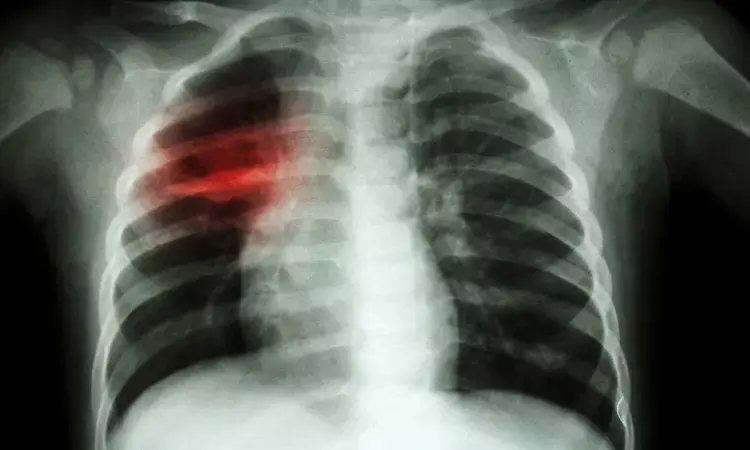- Home
- Medical news & Guidelines
- Anesthesiology
- Cardiology and CTVS
- Critical Care
- Dentistry
- Dermatology
- Diabetes and Endocrinology
- ENT
- Gastroenterology
- Medicine
- Nephrology
- Neurology
- Obstretics-Gynaecology
- Oncology
- Ophthalmology
- Orthopaedics
- Pediatrics-Neonatology
- Psychiatry
- Pulmonology
- Radiology
- Surgery
- Urology
- Laboratory Medicine
- Diet
- Nursing
- Paramedical
- Physiotherapy
- Health news
- Fact Check
- Bone Health Fact Check
- Brain Health Fact Check
- Cancer Related Fact Check
- Child Care Fact Check
- Dental and oral health fact check
- Diabetes and metabolic health fact check
- Diet and Nutrition Fact Check
- Eye and ENT Care Fact Check
- Fitness fact check
- Gut health fact check
- Heart health fact check
- Kidney health fact check
- Medical education fact check
- Men's health fact check
- Respiratory fact check
- Skin and hair care fact check
- Vaccine and Immunization fact check
- Women's health fact check
- AYUSH
- State News
- Andaman and Nicobar Islands
- Andhra Pradesh
- Arunachal Pradesh
- Assam
- Bihar
- Chandigarh
- Chattisgarh
- Dadra and Nagar Haveli
- Daman and Diu
- Delhi
- Goa
- Gujarat
- Haryana
- Himachal Pradesh
- Jammu & Kashmir
- Jharkhand
- Karnataka
- Kerala
- Ladakh
- Lakshadweep
- Madhya Pradesh
- Maharashtra
- Manipur
- Meghalaya
- Mizoram
- Nagaland
- Odisha
- Puducherry
- Punjab
- Rajasthan
- Sikkim
- Tamil Nadu
- Telangana
- Tripura
- Uttar Pradesh
- Uttrakhand
- West Bengal
- Medical Education
- Industry
Nintedanib and prednisone taper combo improves pulmonary exacerbations in radiation pneumonitis

USA: Adding nintedanib to a prednisone taper improves pulmonary exacerbations in grade 2 or higher (G2+) radiation pneumonitis (RP) patients, according to findings from a randomized, phase II, placebo-controlled trial. The trial's results were published in the International Journal of Radiation Oncology - Biology - Physics (IJROBP).
In patients who received nintedanib + prednisone taper, freedom from exacerbation at one year was 72%, and 40% in those who received placebo + prednisone taper. "Patients who received nintedanib were more likely to be free from acute pulmonary exacerbations within one year of study enrollment," the researchers wrote.
Radiation pneumonitis is the most common dose-limiting toxicity for thoracic radiation therapy. Nintedanib treats idiopathic pulmonary fibrosis, which shares pathophysiological pathways with the RP's subacute phase. Andreas Rimner, Weill Cornell Medical Center New York, NY, USA, and colleagues aimed to determine the safety and efficacy of nintedanib addition to a prednisone taper compared to a prednisone taper alone in pulmonary exacerbations reduction in patients with G2+ radiation pneumonitis.
The randomized, phase II, double-blinded, placebo-controlled trial included patients with newly diagnosed G2+ radiation pneumonitis. They were randomized in the 1:1 to nintedanib or placebo ratio in addition to a standard 8-week prednisone taper.
Freedom from pulmonary exacerbations at one year was determined (primary endpoint). Secondary endpoints included pulmonary function tests and patient-reported outcomes. The probability of freedom from pulmonary exacerbations was estimated by Kaplan-Meier analysis. However, owing to slow accrual, the study was terminated early.
The study led to the following findings:
· Enrollment of 34 patients as done between October 2015 and February 2020. Of 30 patients were randomized, out of which 18 were allocated to the experimental Arm A (nintedanib + prednisone taper) and 12 to control Arm B (prednisone taper + placebo).
· In Arm A, freedom from exacerbation at one year was 72% and 40% in Arm B.
· In Arm A, 16 G2+ adverse events were probably related to treatment versus five in the placebo arm.
· In arm A, there were three deaths during the study period due to cardiac failure, progressive respiratory failure, and pulmonary embolism, respectively.
"We observed an improvement in pulmonary exacerbations by adding nintedanib to a prednisone taper," the authors concluded. "Further investigation is warranted for nintedanib use for the treatment of RP."
Reference:
Rimner A, Moore ZR, Lobaugh S, Geyer A, Gelblum DY, Abdulnour RE, Shepherd AF, Shaverdian N, Wu AJ, Cuaron J, Chaft JE, Zauderer MG, Eng J, Riely GJ, Rudin CM, Els NV, Chawla M, McCune M, Li H, Jones DR, Sopka DM, Simone CB 2nd, Mak R, Weinhouse GL, Liao Z, Gomez DR, Zhang Z, Paik PK. Randomized, phase II, placebo-controlled trial of nintedanib for the treatment of radiation pneumonitis. Int J Radiat Oncol Biol Phys. 2023 Mar 6:S0360-3016(23)00177-3. doi: 10.1016/j.ijrobp.2023.02.030. Epub ahead of print. PMID: 36889516.
Dr Kamal Kant Kohli-MBBS, DTCD- a chest specialist with more than 30 years of practice and a flair for writing clinical articles, Dr Kamal Kant Kohli joined Medical Dialogues as a Chief Editor of Medical News. Besides writing articles, as an editor, he proofreads and verifies all the medical content published on Medical Dialogues including those coming from journals, studies,medical conferences,guidelines etc. Email: drkohli@medicaldialogues.in. Contact no. 011-43720751


